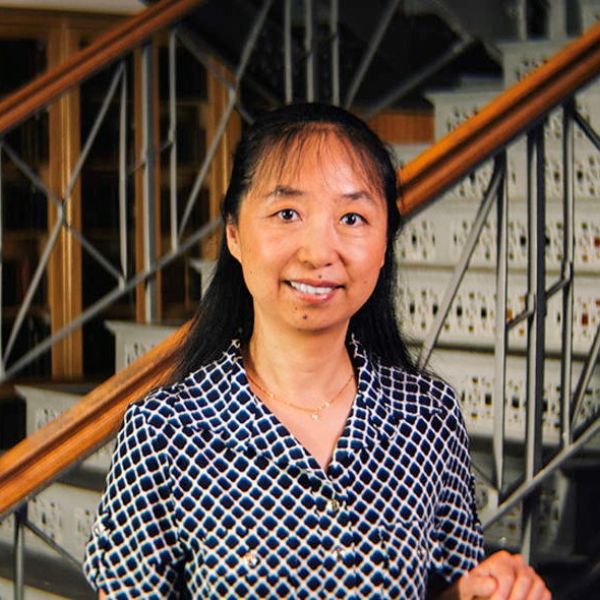Qin Liu, M.D., Ph.D.
-
Professor, Molecular and Cellular Oncogenesis Program, Ellen and Ronald Caplan Cancer Center
Liu applies biostatistics, the statistical analysis of complex data generated through modern biological approaches and clinical information, to find correlations between biomarkers, disease and individual patient health.
Liu earned a medical degree and a master’s degree in health statistics at Shanxi Medical University in Taiyuan, China. She obtained a Ph.D. in biostatistics at Shanghai Medical University in Shanghai, China in 1998. She then completed a postdoctoral fellowship in biostatistics and epidemiology at the University of Massachusetts. While there, she earned a second master’s degree in public health and epidemiology. In 2005, Liu was appointed assistant professor in the Department of Cancer Biology at the University of Massachusetts Medical School (UMMS). Two years later, she joined the Biostatistical Research Group in the Division of Preventive and Behavioral Medicine and served as an assistant professor of Biostatistics in the Department of Medicine at UMMS. Liu joined The Wistar Institute in 2011 as an associate professor and was promoted to professor in 2017.
The Liu Laboratory

The Liu Laboratory
The Liu laboratory applies biostatistics to several areas of research, including: basic cancer research and clinical trials of cancer immunotherapy; infectious diseases; behavioral and educational intervention research; and research on health care outcomes.
-
Scientific Programmer/Analyst
Xiangfan Yin, M.S.
-
Statistical Programmer/Analyst
Jianyi Ding, M.S.
Research
The Biostatistics Unit supervised by Liu provides in-house biostatistics expertise to accommodate continuing growth in translational and pre-clinical cancer research. This Unit provides statistical support to biological laboratories at The Wistar Institute and its tasks include, but not limited to, large data management, experiment design, statistical data analysis, data presentation for manuscripts and grant proposal development. Liu has extensive experience working with basic and clinical investigators on statistical issues. Her strong statistical and biomedical backgrounds have enabled her to provide exceptionally high levels of scientific input for different projects. As a result, her effort has contributed to many published papers and funded grant proposals for clinical and basic science investigators. Within a short time after she joined The Wistar Institute, she engaged in a plethora of collaborative projects with Wistar Cancer Center members and obtained joint NIH funding with inside and outside Wistar investigators, including three P01 Program Project grants on novel molecular therapies of prostate cancer, melanoma targeted therapies, and targeting the epigenetic and metabolic control of EBV-epithelial cancers. There is significant institutional support for collaborative efforts between the Biostatistics Unit and the investigators at Wistar.
Selected Publications
Immunoglobulin G N-glycan markers of accelerated biological aging during chronic HIV infection
Giron LB, Liu Q, Adeniji OS, Yin X, Kannan T, Ding J, Lu DY, Langan S, Zhang J, Azevedo JLLC, Li SH, Shalygin S, Azadi P, Hanna DB, Ofotokun I, Lazar J, Fischl MA, Haberlen S, Macatangay B, Adimora AA, Jamieson BD, Rinaldo C, Merenstein D, Roan NR, Kutsch O, Gange S, Wolinsky SM, Witt MD, Post WS, Kossenkov A, Landay AL, Frank I, Tien PC, Gross R, Brown TT, Abdel-Mohsen M. Immunoglobulin G N-glycan markers of accelerated biological aging during chronic HIV infection. Nature Communications. 2024 Apr 10;15(1):3035. doi: 10.1038/s41467-024-47279-4. PMID: 38600088; PMCID: PMC11006954.
Targeting refractory/recurrent neuroblastoma and osteosarcoma with anti-CD3×anti-GD2 bispecific antibody armed T cells
Yankelevich M, Thakur A, Modak S, Chu R, Taub J, Martin A, Schalk DL, Schienshang A, Whitaker S, Rea K, Lee DW, Liu Q, Shields A, Cheung NK, Lum LG. Targeting GD2-positive Refractory/Resistant Neuroblastoma and Osteosarcoma with Anti- CD3 x Anti-GD2 Bispecific Antibody Armed T cells. Journal for ImmunoTherapy of Cancer. 2024 Mar 21;12(3): doi:1136/jitc-2023-008744. PMID: 37986911; PMCID: PMC10659559.
Identification and verification of plasma protein biomarkers that accurately identify an ectopic pregnancy
Beer LA, Yin X, Ding J, Senapati S, Sammel MD, Barnhart KT, Liu Q*, Speicher DW*, Goldman AR*. Identification and verification of plasma protein biomarkers that accurately identify an ectopic pregnancy. Clin Proteomics. 2023 Sep 15;20(1):37. doi: 10.1186/s12014-023-09425-w. PMID: 37715129; PMCID: PMC10503165.
Elevated pre-mRNA 3′ end processing activity in cancer cells renders vulnerability to inhibition of cleavage and polyadenylation
Cui Y, Wang L, Ding Q, Shin J, Cassel J, Liu Q, Salvino JM, Tian B. Elevated pre-mRNA 3′ end processing activity in cancer cells renders vulnerability to inhibition of cleavage and polyadenylation. Nature Communications. 2023 Aug 1;14(1):4480. doi: 10.1038/s41467-023-39793-8. PMID: 37528120; PMCID: PMC10394034.
Evaluation of drug combination effect using a Bliss independence dose-response surface model.
Liu, Q., Yin, X., Languino, L.R., Altieri, D.C. “Evaluation of drug combination effect using a Bliss independence dose-response surface model.” Statistics in Biopharmaceutical Research 2018.10:2, 112-122, DOI: 10.1080/19466315.2018.1437071.